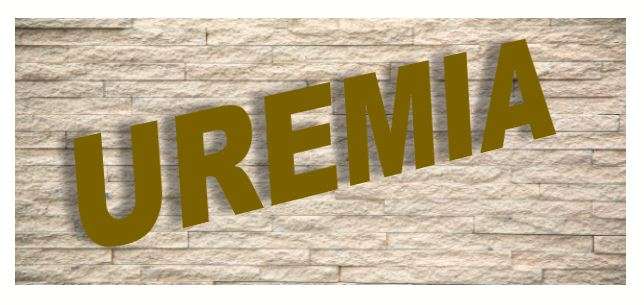Uremia
Uremia means urine in the blood. It is a type of blood poisoning resulting from the retention of waste products usually excreted as urine.
- Uremia results from the failure of the excretory and endocrine functions of the kidneys.
- A decrease in the glomerular filtration rate leads to an accumulation of toxic metabolites, which results in the increase of Blood Urea Nitrogen (BUN) and Creatinine in the blood.
- The impaired tubular function leads to imbalance in the electrolyte, water and acid-base balance.
- The reduced synthesis of erythropoietin and 1.25 OH2 (vitamin D3) leads to renal anemia and renal osteopathy respectively.
- Uremia can be endogenous poisoning that manifests itself in disorders of the heart, gastrointestinal tract, brain and nerves, blood formation and immune system.
- It is largely unclear which substances are responsible for uremia.
- The fact that the symptoms of uremia can be improved in the short term by protein restriction
- Adequate and regular dialysis is the best method to reduce uremic syndrome.
Causes of Uremia
- Acute Kidney Disease (severe and sudden in onset)
- Chronic Kidney Disease (more than three months)
Symptoms of Uremia
With mild to moderate kidney function impairment, there are often no symptoms.
A. General symptoms
Gastrointestinal symptoms
- Anorexia, nausea, vomiting
- Abdominal pain
- Peptic ulcers
- Hiccups
Cardiovascular symptoms
- High blood pressure
- Oedema
- Coronary artery disease
- Heart failure
Neurological symptoms
- Lethargy
- Impaired cognition
- Insomnia (Sleep disorder)
- Restless leg syndrome
- Decreased level of consciousness, seizures and coma
Respiratory symptoms
- Pulmonary oedema
- Pleuritis (Inflammation of pleura)
- Kussmaul breathing (A deep and labored breathing pattern often associated with severe metabolic acidosis)
Renal symptoms
- Oliguria (Urine output <500 ml/day)
- Anuria (Urine output <100 ml/day)
- Proteinuria (Protein in urine)
- Hematuria (Blood in the Urine)
- Nocturia (Frequent urination at night)
Dermatological symptoms
The skin changes caused by uremic disease are subjectively very annoying for the patient. Skin changes in chronic kidney insufficiency are:
- Itching (due to inadequate dialysis, drugs, hyperphosphatemia, allergic reactions)
- Bleeding (the coagulation parameters must be checked)
- Melanosis, gray-brown skin color (especially in areas exposed to the sun, is probably due to the deposition of urochromes and changes in melanin synthesis
- Decreased sweat secretion
- Hair loss (alopecia)
- Sensitivity to cold
- Skin dryness
B. Hormonal changes
Deficit
- Erythropoietin
- 25 (OH)2 – Vitamin D3
- Follicle Stimulating Hormone (FSH)
- Testosterone
- Insulin
Excess
- Parathormone (PTH)
- Prolactin
- Growth hormone
C. Electrolyte imbalances
- Metabolic acidosis (pH: <7.35)
- Hyperkalemia (Potassium: >5.5 mmol/L)
- Hyperphosphatemia (Phosphorous: > 5.0 mg/dl)
- Hypocalcemia (Calcium: < 2.1 mmol/L)
Treatment of Uremia
The ultimate treatment of uremia is renal replacement therapy.
- Dialysis (Hemodialyis or Peritoneal dialysis)
- Hemodialysis (HD): Hemodialysis is an effective renal replacement therapy. Uremic toxins are primarily removed from the blood for detoxification by diffusion process. The early initiation of renal replacement therapy can prevent or reduce complications for uremic
- Peritoneal Dialysis (PD): Peritoneal dialysis is a kidney replacement procedure used to treat kidney failure. By letting dialysate (dialysis fluid) into the abdominal cavity, the peritoneum is used as a semipermeable membrane for flushing out substances subject to excretion.
- Kidney transplant: A kidney transplant is the transplantation of a kidney from an organ donor to an organ recipient. Kidney transplantation is the only treatment option besides dialysis for patients with end-stage renal failure. However, the number of suitable donor organs available is small.
Prevention of Uremia
- Regular and adequate Dialysis
- Avoid foods rich in sodium, potassium and phosphorous
- Healthy food
- Exercise
- Control diabetes
- Maintain blood pressure
- Maintain cardiac health
- Avoid smoking
Complications of Uremia
- Cardiovascular disease
- Renal osteopathy
- Eye disorders
- Malnutrition
- Depression
- Pruritus
- Tumour or cancer
References
- Uremia: Causes, Symptoms, and Treatments (healthline.com)
- Uremia: Treatment, symptoms, and causes (medicalnewstoday.com)
- Uremia (slideshare.net)

